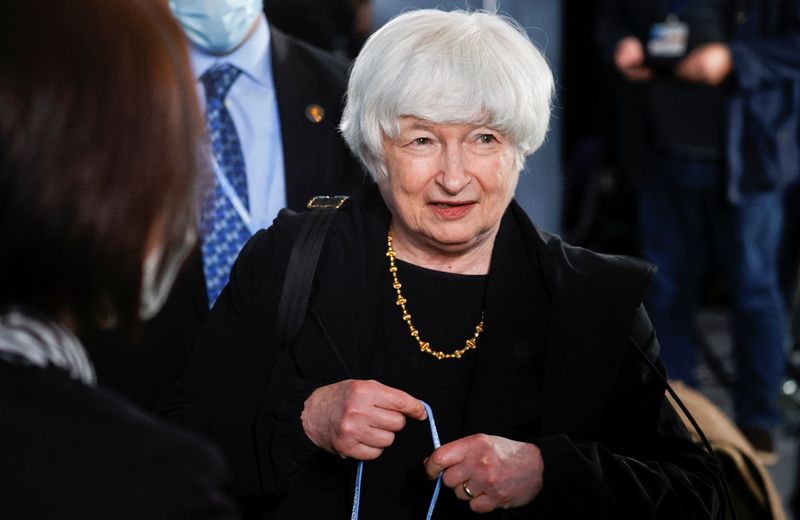WASHINGTON (Reuters) -U.S. Treasury Secretary Janet Yellen said on Tuesday that the bipartisan infrastructure package approved by Congress and President Joe Biden’s proposed social and climate spending plan would increase U.S. productivity and the size of its labor force.
Yellen said in prepared remarks to a University of Nevada-Las Vegas economic conference that together, the two bills would increase long-term U.S. economic output without increasing the national debt, and their revenue-raising measures would reduce deficits over time.
“I do believe that the passage of these pieces of legislation will lead not only to higher rates of productivity but to positive changes across a wide array of metrics. They will increase the size of our labor force and expand the productive capacity of our economy,” Yellen said.
The “Build Back Better” bill’s investments in child care would allow many American mothers to return to the work force, she said, citing studies showing that from 2018 to 2019 some 2 million parents of young children had to quit a job, forego a job or greatly change their job to deal with child care issues.
Universal pre-school as proposed in the bill will also help parents stay in the workforce and pay dividends in future decades by improving graduation rates and the income-earning prospects of future workers, Yellen said.
In a separate interview with National Public Radio’s Marketplace program, Yellen said the bill would address longstanding problems in the economy.
“Over the medium term, this is anti inflationary. It’s easing expenses for families.”
In comments to Gray Television on Monday, U.S. Representative Kevin Brady, the top Republican on the tax-writing House Ways and Means Committee, disputed claims that the spending bill would expand the U.S. workforce, saying that higher taxes on wealthier business owners would discourage hiring, while an expanded Child Tax Credit would discourage low wage workers from taking jobs.
“They’re going to make the labor shortage worse because they’re removing the requirement to work from the child tax credit, basically chasing a million-and-a-half workers out of the workforce,” he said, adding this would fuel inflation.
Yellen said she did not see a 1970s-style inflation spiral developing because the Federal Reserve would not allow inflation expectations to become “embedded in the American psyche.”
In her UNLV remarks, Yellen said the tax provisions in the proposal would make the U.S. tax code “substantially more progressive by imposing higher taxes on the wealthy and improving compliance by wealthy taxpayers.
“Our compliance efforts to ensure wealthy people pay what they owe will raise an estimated $400 billion – and that’s probably a conservative projection,” Yellen said, echoing comments to Reuters https://www.reuters.com/world/us/irs-plan-collect-400-bln-unpaid-taxes-relies-deterrence-us-treasurys-adeyemo-2021-11-01 by her deputy, Wally Adeyemo.
“Another $400 billion will come from closing loopholes utilized by wealthy taxpayers; and another $200 billion through a surtax on the country’s highest earners, people making more than $10 million a year,” Yellen said.
(Reporting by David Lawder; Editing by Dan Grebler and Aurora Ellis)





















